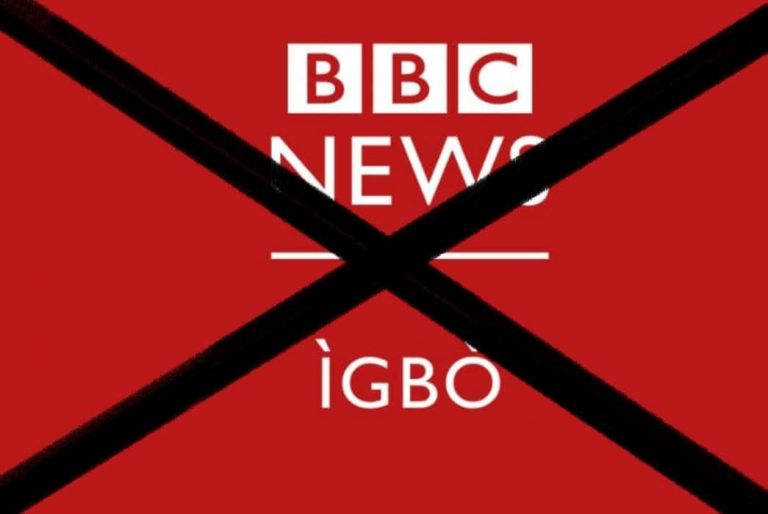BBC (British Broadcasting Corporation) News Igbo was introduced in Nigeria on the 19th of February 2018. It was constituted to be a subsidiary of BBC News Nigeria in the new BBC Indigenous Language series.
Their reportage include Sports, Entertainment series and Political news encompassing the whole of Nigeria written in Indigenous Igbo language.
The moderators and chief publishers who are mostly Igbos have come under intense fire of recent for not representing the indigenous Igbo culture and traditions. This is because as the usual directive of the BBC corporation, it has been demanded that BBC subsidiaries should not focus on personalised or sentimental topics bothering on politics and state of affairs of the country.
This has led to a lot of bias in BBC Igbo news reportage unlike their fellow News subsidiaries such as BBC Hausa and BBC Yoruba who go a long way in portraying the Hausa and Yoruba culture in a more definite light, endearing it to public views and opinions.
The Igbo culture and political system differ significantly from most of its other tribes With exception of a few major Igbo communities which have an Obi (King), Igbos have a traditional republican system of government, which is a consultative assembly of people, which guarantees equality to citizens. This system is a departure from the usual form of Government with a king ruling over the subjects. Even though there are titleholders who are respected by their achievements, they are never revered as kings. Before the advent of colonial administration, the largest political unit was the village group, a federation of villages averaging about 5,000 persons. Members of the group shared a common market and meeting place, a tutelary deity, and ancestral cults that supported a tradition of descent from a common ancestor or group of ancestors. Authority in the village group was vested in a council of lineage heads and influential and wealthy men. In the eastern regions, these groups tended to form larger political units, including centralized kingdoms and states.
Read Also: Nnamdi Kanu Blasts BBC Nigeria For Falsified Publication About Him
Igbos have shared a long history of discrimination and marginalisation in Nigeria, this was the major reason for Secessionist movements, calls for regionalisation and restructuring and the clamour for an independent Igbo land which would be called Biafra. The marginalisation is felt in every major sector of the country, it has been discussed, deliberated on and debated on for many years on end.
These numerous components of the Igbo historical culture and political travails are subjects that should have been brought to the fore by the dedicated BBC Igbo service. But their reportage consists of banters and jabs at the core Ndigbo, outright criticism of secessionist groups and the Biafran notion and haphazard, poorly researched documentaries on the Igbo culture and traditions.
This partisan, biased method of journalism has not gone unnoticed by numerous organisations who have in the past called out the BBC Igbo News publishers on the lacklustre form of news broadcast they are running. They have also been openly accused of practising ‘cheap and brown’ envelope journalism which involves collecting ‘bribes’ and ‘levies’ to project a notion or propaganda as proper at the detriment of the other and their major benefactors are the Nigerian Government.
The BBC Corporation has also been very notorious in the past for distorting, twisting facts, and information in their reports when it comes to matters of Igbo politics. This dates back to the Civil war of 1967 to 1970 when a British Journalist and Author Frederick Forsyth, who worked as an Assistant Diplomatic Correspondent for the BBC Africa Service in Enugu reportedly left the corporation after exposing their lies and distortions on the Nigerian Civil war. He talked about how the service tried to coerce him and force him to report in favour of the Nigerian Government and the Genocide being meted out to the Biafrans.
This distortion and manipulation were what caused the Ban on BBC in Burundi. BBC was banned from the country and taken its radio off the airwaves after they were accused of “false’’ reporting on secret torture centres. Other countries where BBC has been banned include: Iran, where the Iranian government banned the BBC for six years for wrong biased reportage; Zimbabwe also banned BBC for six years for the same reasons; In 2015, Rwanda placed an indefinite suspension on the BBC after a row over its 1994 documentary on genocide. BBC is also banned from reporting from Burma and they have been threatened in Russia and India over conflicting, propaganda bound News reportages.
BBC Igbo is an outright benefactor of the British Government, pushing their agendas for oil monopoly and political infiltration in the Nigerian Government. If they continue in this path, they would lose their credibility in the Nigerian media sector.
AFRICA DAILY NEWS, NEW YORK










